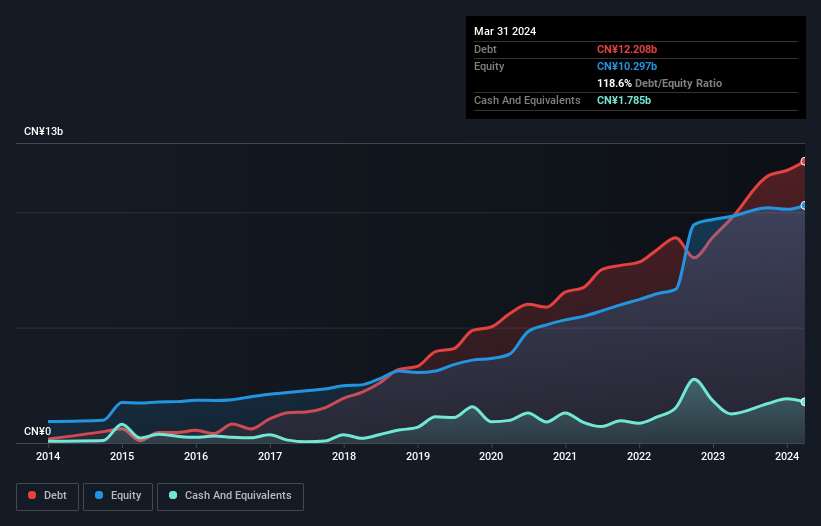- China
- /
- Commercial Services
- /
- SHSE:603588
Beijing GeoEnviron Engineering & Technology (SHSE:603588) Use Of Debt Could Be Considered Risky

Howard Marks put it nicely when he said that, rather than worrying about share price volatility, 'The possibility of permanent loss is the risk I worry about... and every practical investor I know worries about.' When we think about how risky a company is, we always like to look at its use of debt, since debt overload can lead to ruin. We can see that Beijing GeoEnviron Engineering & Technology, Inc. (SHSE:603588) does use debt in its business. But should shareholders be worried about its use of debt?
When Is Debt Dangerous?
Debt assists a business until the business has trouble paying it off, either with new capital or with free cash flow. Part and parcel of capitalism is the process of 'creative destruction' where failed businesses are mercilessly liquidated by their bankers. However, a more frequent (but still costly) occurrence is where a company must issue shares at bargain-basement prices, permanently diluting shareholders, just to shore up its balance sheet. Of course, the upside of debt is that it often represents cheap capital, especially when it replaces dilution in a company with the ability to reinvest at high rates of return. When we think about a company's use of debt, we first look at cash and debt together.
Check out our latest analysis for Beijing GeoEnviron Engineering & Technology
What Is Beijing GeoEnviron Engineering & Technology's Debt?
The image below, which you can click on for greater detail, shows that at March 2024 Beijing GeoEnviron Engineering & Technology had debt of CN¥12.2b, up from CN¥9.71b in one year. However, it also had CN¥1.78b in cash, and so its net debt is CN¥10.4b.

How Strong Is Beijing GeoEnviron Engineering & Technology's Balance Sheet?
Zooming in on the latest balance sheet data, we can see that Beijing GeoEnviron Engineering & Technology had liabilities of CN¥11.0b due within 12 months and liabilities of CN¥5.70b due beyond that. Offsetting this, it had CN¥1.78b in cash and CN¥5.06b in receivables that were due within 12 months. So its liabilities total CN¥9.90b more than the combination of its cash and short-term receivables.
When you consider that this deficiency exceeds the company's CN¥7.57b market capitalization, you might well be inclined to review the balance sheet intently. Hypothetically, extremely heavy dilution would be required if the company were forced to pay down its liabilities by raising capital at the current share price.
We measure a company's debt load relative to its earnings power by looking at its net debt divided by its earnings before interest, tax, depreciation, and amortization (EBITDA) and by calculating how easily its earnings before interest and tax (EBIT) cover its interest expense (interest cover). Thus we consider debt relative to earnings both with and without depreciation and amortization expenses.
Beijing GeoEnviron Engineering & Technology has a rather high debt to EBITDA ratio of 7.0 which suggests a meaningful debt load. However, its interest coverage of 2.9 is reasonably strong, which is a good sign. Another concern for investors might be that Beijing GeoEnviron Engineering & Technology's EBIT fell 18% in the last year. If things keep going like that, handling the debt will about as easy as bundling an angry house cat into its travel box. When analysing debt levels, the balance sheet is the obvious place to start. But it is future earnings, more than anything, that will determine Beijing GeoEnviron Engineering & Technology's ability to maintain a healthy balance sheet going forward. So if you want to see what the professionals think, you might find this free report on analyst profit forecasts to be interesting.
Finally, a company can only pay off debt with cold hard cash, not accounting profits. So we always check how much of that EBIT is translated into free cash flow. Over the last three years, Beijing GeoEnviron Engineering & Technology saw substantial negative free cash flow, in total. While investors are no doubt expecting a reversal of that situation in due course, it clearly does mean its use of debt is more risky.
Our View
On the face of it, Beijing GeoEnviron Engineering & Technology's net debt to EBITDA left us tentative about the stock, and its conversion of EBIT to free cash flow was no more enticing than the one empty restaurant on the busiest night of the year. And even its level of total liabilities fails to inspire much confidence. Considering all the factors previously mentioned, we think that Beijing GeoEnviron Engineering & Technology really is carrying too much debt. To us, that makes the stock rather risky, like walking through a dog park with your eyes closed. But some investors may feel differently. There's no doubt that we learn most about debt from the balance sheet. However, not all investment risk resides within the balance sheet - far from it. To that end, you should learn about the 3 warning signs we've spotted with Beijing GeoEnviron Engineering & Technology (including 1 which is concerning) .
If you're interested in investing in businesses that can grow profits without the burden of debt, then check out this free list of growing businesses that have net cash on the balance sheet.
Valuation is complex, but we're here to simplify it.
Discover if Beijing GeoEnviron Engineering & Technology might be undervalued or overvalued with our detailed analysis, featuring fair value estimates, potential risks, dividends, insider trades, and its financial condition.
Access Free AnalysisHave feedback on this article? Concerned about the content? Get in touch with us directly. Alternatively, email editorial-team (at) simplywallst.com.
This article by Simply Wall St is general in nature. We provide commentary based on historical data and analyst forecasts only using an unbiased methodology and our articles are not intended to be financial advice. It does not constitute a recommendation to buy or sell any stock, and does not take account of your objectives, or your financial situation. We aim to bring you long-term focused analysis driven by fundamental data. Note that our analysis may not factor in the latest price-sensitive company announcements or qualitative material. Simply Wall St has no position in any stocks mentioned.
About SHSE:603588
Beijing GeoEnviron Engineering & Technology
Beijing GeoEnviron Engineering & Technology, Inc.
Very undervalued average dividend payer.
Market Insights
Community Narratives




